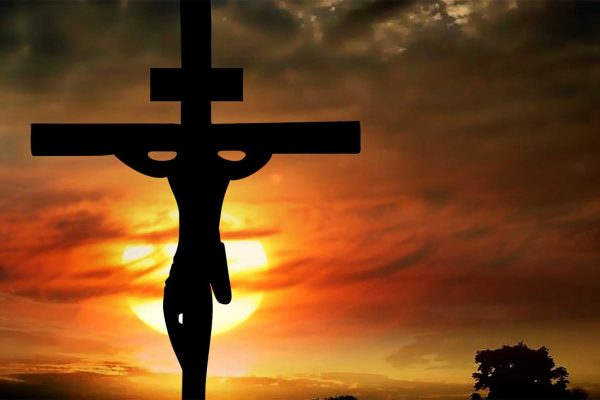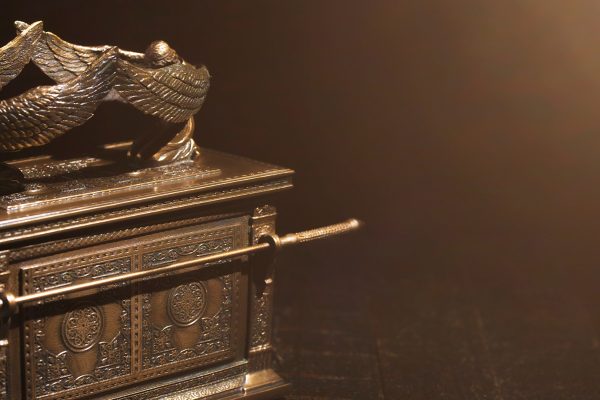Awaiting Our Messiah
Looking Forward
By Tim Moore
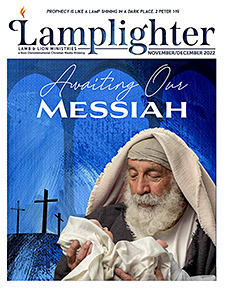
And there was a man in Jerusalem whose name was Simeon; and this man was righteous and devout, looking forward to the consolation of Israel; and the Holy Spirit was upon him. Luke 2:25
In the long dark years following the completion of the Old Testament, Israel descended into a period of silent darkness. As prophesied, there seemed to be a famine for the Word of the Lord, because following Malachi there were no more revelations.
The Greek Empire rose and fell, eventually giving way to the Roman Empire. Positioned at the crossroads of the ancient world, Israel became a subject state. Short-lived revolts offered short-lived hope. Just over 2,000 years ago, the heavy boot of Roman peace had crushed the religious and nationalistic hopes of most Jews. Only the Zealots were ready to take up arms and fight against Rome.
The Judean provinces represented an ongoing annoyance to the Roman overlords. Always bickering, and stubbornly resistant to embracing Roman gods, the Jews insisted on stiffening their necks and worshipping their own God instead of going with the flow of Roman rule.
It was during this dark time in human history—in a remote but strategic location—that God sent His Son into the world.
We are all familiar with the Christmas story, even if some of the details we know are extrabiblical. Gabriel appeared first to John the Baptist’s father, Zecharias, and then to Mary. Joseph also had an angelic visitor who foretold Jesus’ birth.
Other than those three and Zecharias’ wife, Elizabeth, there is no record in Scripture of Jesus’ actual birth being foretold to anyone else.
On the night Jesus was born, angels appeared in the sky above Bethlehem. They did not come to proclaim the Good News to the well-connected or religiously proud. They came to “some shepherds”—men on the very edges of society who slept with their livestock in the fields by night. But, oh, what a sight they beheld when a multitude of the heavenly host appeared above their heads and burst into a song of praise. Advised of the Savior’s birth, they hurried to Bethlehem to see the Baby. As they returned to their flocks, they went “glorifying and praising God for all that they had heard and seen, just as had been told to them” (Luke 2:20).
But there were two other people who the Bible says were anticipating the Lord’s Messiah. Simeon was an old man who was looking for “the consolation of Israel”—a title referring to the promise that the Messiah would deliver Israel. And Anna was an 84-year-old prophetess. Widowed for many years, she was at the temple night and day, fasting and praying and waiting upon the Lord.
Luke describes how these two faithful Jews were given the blessing of meeting the Baby Jesus. The Holy Spirit had revealed to Simeon that he would not see death before he had seen the Christ (Luke 2:26). Anna too was spiritually discerning. As soon as she saw Him, she recognized Jesus as the Anointed One and gave thanks to God for allowing her to look upon the Redemption of Jerusalem.
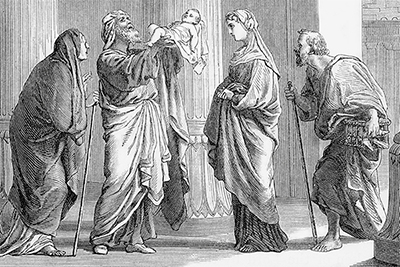
Why Only Two?
We might like to assume that Simeon and Anna—a devout man and woman— were representative of a much larger group that was awaiting the Messiah. But I do not think that is the case. We know that when the magi came to Jerusalem seeking to find and worship the “King of the Jews,” Herod was troubled—and all Jerusalem along with him.
Why was the Idumean king troubled, and why was the city upset along with him? Certainly not because they lacked signs regarding Jesus’ birth. The chief priests and scribes who assembled to respond to Herod’s inquiry rightly said the Messiah would be born “in Bethlehem of Judea, for this is what has been written by the prophet” (Matthew 2:5). Scripture does not indicate that any of them bothered to go to Bethlehem and see for themselves. Unlike the lowly shepherds who hurried to see Baby Jesus, they couldn’t be bothered to trek the handful of miles to the city of David—literally on the outskirts of Jerusalem to the south.
Herod too was uninterested in going to see or worship the infant King of the Jews. He sent the visiting magi on their way and asked them to report back to him. Herod’s claimed desire to eventually worship was patently false, which is why God warned the wise men in a dream not to return to Herod.
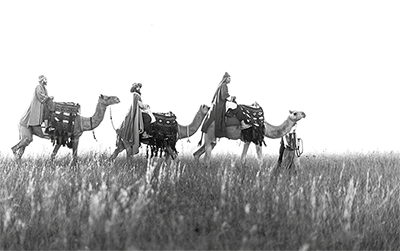
No, the Idumean king of the Jews was troubled because the true King of the Jews—even as a small child in Bethlehem—represented a great threat to his reign. Herod had his beloved wife Mariamne and two of his own sons killed, just because his paranoia led him to think his power was at risk. So, given Herod’s tendency to lash out at anyone who might undermine his claim to the throne, the entire city was on edge wondering how he might react when foreign emissaries came to worship the newborn Messiah.
Isaiah said that the Messiah would spring from the root of Jesse (Isaiah 11:1), but that like a “tender shoot” or a “root out of parched ground,” He would have “no stately form or majesty” (Isaiah 53:2). Regarding the reference to parched ground, the 400-year gap between the Old Testament and the New reflects that period of heavenly silence and demonstrates at least a partial fulfillment of Amos 8:11-12:
“Behold, days are coming,” declares the Lord God, “When I will send a famine on the land, not a famine for bread or a thirst for water, but rather for hearing the words of the LORD. People will stagger from sea to sea and from the north even to the east; they will go to and fro to seek the word of the LORD, but they will not find it.”
The Anointed One born in Bethlehem was not the mighty warrior king many Jews were longing for. They wanted a savior to deliver them from Roman oppression and restore their national primacy, not a Savior to deliver them from their sins and restore their relationship with Almighty God. Indeed, the priests and scribes took great offense when Jesus dared to suggest that they would be deemed unworthy, or even worse, that the grace of God would be extended to Gentiles instead of them. It was Jesus’ reference to God’s blessing being extended to Gentiles instead of Jews that outraged the people gathered at the synagogue in Nazareth (Luke 4:22-29).
From the time He was born, Jesus was not heralded by the masses. According to Scripture there were only six Jews (Mary, Joseph, Zacharias, Elizabeth, Simeon, and Anna) who were looking forward to Jesus ahead of time, along with “some shepherds” who were told of His arrival. The rest of the Jewish society seems to have been going about their lives with no spiritual discernment whatsoever.

The Consistent Pattern During His Ministry
As a child, Jesus was not just precocious; He was unlike anyone who had come before (understatement of all time!). When He was only 12 years old, the teachers of the Law at the temple were “amazed at His understanding and His answers” (Luke 2:47). After His public ministry began, He confounded the scribes and Pharisees by teaching as someone with authority. And still, people did not recognize Him for Who He was.
Even Jesus’ disciples were unsure what to make of Him. Multiplying loaves and fish; calming a stormy sea; healing the deaf, lame, leprous, and blind; releasing the demon-possessed from bondage; it still took the revelation of the Father in heaven for Peter to finally confess, “You are the Christ, the Son of the living God” (Matthew 16:13-17).
Meanwhile, the masses, although drawn by miracles of nourishment and healing, were largely unaware that Jesus was the prophesied Messiah.
For His own good reasons Jesus did not broadcast that fact. More often than not He told the people He healed to follow the Law but not tell anyone about Him. He even spoke in parables so that the fulness of His meaning would be unrecognizable by the masses who had not really put their trust in Him. His words and the truth they revealed were for “those with eyes to see and ears to hear” (Matthew 13:16).
In a very real sense, only the sheep who recognized His voice would hear and follow Him—then, and now (John 10:27-28).
My sheep hear My voice, and I know them, and they follow Me; and I give eternal life to them, and they will never perish; and no one will snatch them out of My hand. John 10:27-28
For some of us, the promise of His coming resonates in our hearts and inspires our days. We wake up every morning hoping that He will come that very day.
What About Today?
If the anticipation of His first coming was so sparse, what about today? Like society in ancient Judea, people still tend to fall into one of several different categories:
1. Some people literally do not know that Jesus is coming again. They either don’t know Him at all, or nobody has told them that He is coming.
2. Others claim to know Him, but do not live as if He has had any impact on their lives. They manifest complete apathy about His return.
3. Other ostensibly faithful Christians are convinced that He is not coming anytime soon, or at least not in a glorious manner that will fulfill the prophecies of His coming literally. They are often ignorant or fearful of Bible prophecy, convinced that it doesn’t have any relevance to their daily lives.
4. But for some of us, the promise of His coming resonates in our hearts and inspires our days. We wake up every morning hoping that He will come that very day. We take communion faithful to Paul’s admonition that we commemorate Christ’s death “until He comes” (1 Corinthians 11:26). We long for Jesus to come again even as we seek to serve Him in this life.
The unbelieving world clearly fits in Category 1. People who do not know the Lord or have rejected Him outright do not realize that He is coming soon. They live carefree lives oblivious to the fact that they live on the brink of eternity and that the wrath of God abides on them (John 3:36). Living in spiritual darkness, they say, “peace and safety,” unaware that “destruction will come upon them suddenly like labor pains upon a woman with child” (1 Thessalonians 5:3). Like most of the people living in the time of Noah, they will be swept away when God’s wrath is poured out upon the world.
Too many professing Christians fall into Category 2. Polls by the Pew Research Center, the Barna Group, and other Christian-affiliated organizations have proven that many self-declared Christians do not adhere to the basic tenets of the faith. They don’t believe in Creation as described in the Bible, the virgin birth of Christ, the literal death and resurrection of Jesus, or the promise of His return.
(Astoundingly, 20% of professing Christians say they don’t believe in the God of the Bible!)
We are witnessing a great falling away of these Christians of convenience as our society becomes increasingly hostile to genuine Christian faith. Without social capital to be gained from church membership, the rolls have declined dramatically in many urban areas. The accelerating drift of lukewarm Christians toward secularism explains why “None” is the fastest growing category of religious affiliation in the United States today.
Over the past several years, I’ve come to realize that most churches fit into Category 3. Even vibrant churches full of sincere followers of Jesus Christ manifest an aversion to His prophetic Word. Disdainful of extremists who have sown division and fanatics who peddle in the sensational and manipulate and misquote the Word of God, many pastors are leery of any presentation relating to Bible prophecy.
But the signs of the times are so obvious that faithful Christians are moving into Category 4—eagerly awaiting the Messiah and hungry for teaching and preaching about Bible prophecy.

Casting Our Crowns
When the magi came from the East, they brought gifts to the infant Jewish King. Scripture says that they presented Him with gold, frankincense, and myrrh—rich gifts suitable for royalty. Over time, song and lore envisioned these wise men as kings, and assumed that there were three of them because that was the number of their gifts. But the Bible does not specify that detail and it is unlikely that they were rulers in the classical sense.
What we do know is that the wise men discerned a sign in the heavens and undertook a long and difficult journey to see the Messiah. The magis’ quest to encounter the Holy One of Israel offers a model for us—along with their determination to have something of value to present to Him.
I opened this article focusing on Simeon and Anna, the only two Jews recorded in the Gospels as eagerly anticipating the Messiah other than Jesus’ parents and Zacharias and Elizabeth. Even John leaped for joy while still in his mother’s womb in the presence of his unborn Lord.
We believe that the wise men learned of the coming Messiah from the Hebrew scriptures and from the testimony of faithful Jews who lived in the pagan kingdom of Babylon. In that regard, they had the same prophetic Word we have in the Old Testament— although we have the complete canon of the Old and New Testament prophecies. And, we have the gift of the Holy Spirit dwelling in us, illuminating God’s Word in our hearts.
So why aren’t we as determined to watch for the signs the Lord is revealing all around us today? The signs of the times are multiplying before our eyes—and converging as never before. Soon—perhaps very soon—He will burst from the sky. We won’t have to follow “yonder star” to find His humble birthplace, He will come in radiant glory to reign upon the earth.
Have you ever wondered what you will give Him when you first see Him?
That is a question worth pondering. Scripture speaks of several crowns we will be awarded in heaven:
- An imperishable crown (1 Corinthians 9:24-25)
- A crown of exultation or rejoicing (1 Thessalonians 2:19)
- A crown of glory (1 Peter 5:4)
- A crown of life (Revelation 2:10)
Paul also says that there is a crown of righteousness laid up for all who have loved Jesus’ appearing (2 Timothy 4:8). That is one crown reserved just for those who have been eager to see the Messiah, like Simeon and Anna.
I’ve always wondered what I would do with a crown. Then, reflecting on the magi’s gifts and turning to God’s prophetic Word it dawned on me. Like the elders described in Revelation 4:10, we will cast our crowns before the throne of the Lamb and say,
Worthy are You, our Lord and our God, to receive glory and honor and power; for You created all things, and because of Your will they existed, and were created.
Oh, how I want those crowns! Not for my own glory—or to give me what David Reagan describes as an eternal neck ache!! Any glory that I experience will be a reflection of the glory that is His. The eternal life I enjoy will be thanks only to His death and resurrection.
And the righteousness manifest in the crown I receive will be credited to me from His infinite righteousness and holiness.
Even the crowns He gives me belong to Him. I want all five crowns to be able to lay them as gifts at the feet of my Lord and Savior.
Looking Forward
I believe that some reading this magazine in 2022 will not see death before the Lord’s Messiah comes (Luke 2:26). Are you praying earnestly for Jesus to rend the heavens and come down? Do you wake up each day crying out, “Maranatha! Come quickly, Lord Jesus!”
The “Light of revelation to the Gentiles and the glory of [God’s] people Israel” has come. He is coming again— not as a humble babe to be wrapped in swaddling cloths, but in power and glory.
The last stanza of We Three Kings sounds the expectant, triumphal chorus of the Second Coming:
Glorious now behold Him arise;
King and God and sacrifice:
Alleluia, Alleluia,
Sounds through the earth and skies.
Amen. Come Lord Jesus!

